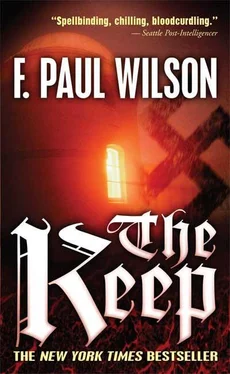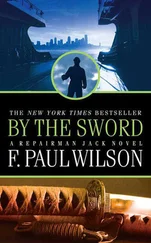F. Paul Wilson - The Keep
Здесь есть возможность читать онлайн «F. Paul Wilson - The Keep» весь текст электронной книги совершенно бесплатно (целиком полную версию без сокращений). В некоторых случаях можно слушать аудио, скачать через торрент в формате fb2 и присутствует краткое содержание. Жанр: Ужасы и Мистика, на английском языке. Описание произведения, (предисловие) а так же отзывы посетителей доступны на портале библиотеки ЛибКат.
- Название:The Keep
- Автор:
- Жанр:
- Год:неизвестен
- ISBN:нет данных
- Рейтинг книги:3 / 5. Голосов: 1
-
Избранное:Добавить в избранное
- Отзывы:
-
Ваша оценка:
- 60
- 1
- 2
- 3
- 4
- 5
The Keep: краткое содержание, описание и аннотация
Предлагаем к чтению аннотацию, описание, краткое содержание или предисловие (зависит от того, что написал сам автор книги «The Keep»). Если вы не нашли необходимую информацию о книге — напишите в комментариях, мы постараемся отыскать её.
The Keep — читать онлайн бесплатно полную книгу (весь текст) целиком
Ниже представлен текст книги, разбитый по страницам. Система сохранения места последней прочитанной страницы, позволяет с удобством читать онлайн бесплатно книгу «The Keep», без необходимости каждый раз заново искать на чём Вы остановились. Поставьте закладку, и сможете в любой момент перейти на страницу, на которой закончили чтение.
Интервал:
Закладка:
1035 hours
Land was in sight again.
Sixteen unnervingly frustrating hours, each one like an endless day, were finally at an end. The red-haired man stood on the weathered bow and looked shoreward. The sardiner had chugged across the placid expanse of the Black Sea at a steady pace, a good pace, but one made maddeningly slow by the sole passenger's relentless sense of urgency. At least they had not been stopped by either of the two military patrol boats they had passed, one Russian, one Romanian. That could have proved disastrous.
Directly ahead lay the multichanneled delta where the Danube emptied into the Black Sea. The shore was green and swampy, pocked with countless coves. Getting ashore would be easy, but traveling through the bogs to higher, drier land would be time consuming. And there was no time!
He had to find another way.
The red-haired man glanced over his shoulder at the old Turk at the helm, then forward again to the delta. The sardine boat didn't draw much—it could move comfortably in about four feet of water. It was a possibility—take one of these tiny delta tributaries up to the Danube itself, then chug west along the river to a point, say, just east of Galati. They would be traveling against the current but it had to be faster than scrambling on foot through miles of sucking mire.
He dug into his money belt and brought out two Mexican fifty-peso pieces. Together they gave a weight of about two and a half ounces of gold. Turning again, he held them up to the Turk, addressing him in his native tongue.
"Kiamil! Two more coins if you'll take me upstream!"
The fisherman stared at the coins, saying nothing, chewing his lower lip. There was already enough gold in his pocket to make him the richest man in his village. At least for a while. But nothing lasts forever, and soon he would be out on the water again, hauling in his nets. The two extra coins could forestall that. Who knew how many days on the water, how many hand cuts, how many pains in an aging back, how many hauls of fish would have to be unloaded at the cannery to earn an equivalent amount?
The red-haired man watched Kiamil's face as the calculations of risks against profits played across it. And as he watched, he, too, calculated the risks: They would be traveling by day, never far from shore because of the narrowness of the waterway along most of the route, in Romanian waters in a boat of Turkish registry.
It was insane. Even if by some miracle of chance they reached the edge of Galati without being stopped, Kiamil could not expect a similar miracle on the return trip downstream. He would be caught, his boat impounded, and he imprisoned. Conversely, there was little risk to the red-haired man. If they were stopped and brought into port, he was sure he could find a way to escape and continue his trek. But Kiamil at the very least would lose his boat. Possibly his life.
It wasn't worth it. And it wasn't fair. He lowered the coins just as the Turk was about to reach for them.
"Never mind, Kiamil," he said. "I think it might be better if we just keep to our original agreement. Put me ashore anywhere along here."
The old man nodded, relief rather than disappointment showing on his leathery face at the withdrawal of the offer. The sight of the gold coins held out to him had almost turned him into a fool.
As the boat nosed toward shore, the red-haired man slipped the cord that tied the blanket roll with all his possessions over his shoulder and lifted the long, flat case under his arm. Kiamil reversed the engines within a foot or two of the gray mixture of sand and dirt overgrown with rank, wiry grasses that served for a bank here. The red-haired man stepped onto the gunwale and leaped ashore.
He turned to look back at Kiamil. The Turk waved and began to back the boat away from shore.
"Kiamil!" he shouted. "Here!" He tossed the two fifty-peso gold pieces out to the boat one at a time. Each was unerringly snatched from the air by a brown, callused hand.
With loud and profuse thanks in the name of Mohammed and all that was holy in Islam ringing in his ears, the red-haired man turned and began to pick his way across the marsh. Clouds of insects, poisonous snakes, and bottomless holes of quicksand lay directly ahead of him, and beyond that would be units of Iron Guard. They could not stop him, but they could slow him down. As threats to his life they were insignificant compared to what he knew lay half a day's ride due west in the Dinu Pass.
SEVENTEEN
The Keep
Wednesday, 30 April
1647 hours
Woermann stood at his window and watched the men in the courtyard. Yesterday they had been intermingled, the black uniforms interspersed with the gray ones. This afternoon they were separated, an invisible line dividing the einsatzkommandos from the regular army men.
Yesterday they had had a common enemy, one who killed regardless of the color of the uniform. But last night the enemy had not killed, and by this afternoon they were all acting like victors, each side claiming credit for the night of safety. It was a natural rivalry. The einsatzkommandos saw themselves as elite troops, SS specialists in a special kind of warfare. The regular army men saw themselves as the real soldiers; although they feared what the black uniform of the SS represented, they looked on the einsatzkommandos as little more than glorified policemen.
Unity had begun to break down at breakfast. It had been a normal mess period until the girl, Magda, had shown up. There had been some good-natured jostling and elbowing for a place near her as she moved past the food bins, filling a tray for herself and her father. Not an incident really, but her very appearance at morning mess had begun to divide the two groups. The SS contingent automatically assumed that since she was a Jew they had a pre-emptive right to do with her as they wished. The regular army men did not feel anyone had a pre-emptive right to the girl. She was beautiful. Try as she might to cover her hair in that old kerchief and bundle her body in those shapeless clothes, she could not conceal her femininity. It radiated through all her attempts to minimize it. It was there in the softness of her skin, in the smoothness of her throat, the turn of her lips, the tilt of her sparkling brown eyes. She was fair game for anyone as far as the regular army troops were concerned—with the real fighting men getting first chance, of course.
Woermann hadn't noticed it at the time but the first cracks in the previous day's solidarity had appeared.
At the noon mess a shoving match between gray uniforms and black ones began, again while the girl was going through the line. Two men slipped and fell on the floor during the minor fracas, and Woermann sent the sergeant over to break it up before any serious blows could be struck. By that time Magda had taken her food and departed.
Shortly after lunch she had wandered about, looking for him. She had told him that her father needed a cross or a crucifix as part of his research into one of the manuscripts. Could the captain lend her one? He could—a little silver cross removed from one of the dead soldiers.
And now the off-duty men sat apart in the courtyard while the rest worked at dismantling the rear of the keep. Woermann was trying to think of ways to avoid certain trouble at the evening mess. Maybe the best thing to do was to have someone load up a tray at each meal and bring it to the old man and his daughter in the tower. The less seen of the girl, the better.
His eyes were drawn to movement directly below him. It was Magda, hesitant at first, and then with straight-backed, high-chinned decisiveness, marching bucket in hand toward the cellar entry. The men followed her at first with their eyes, then they were on their feet, drifting toward her from all corners of the courtyard, like soap bubbles swirling toward an unstoppered drain.
Читать дальшеИнтервал:
Закладка:
Похожие книги на «The Keep»
Представляем Вашему вниманию похожие книги на «The Keep» списком для выбора. Мы отобрали схожую по названию и смыслу литературу в надежде предоставить читателям больше вариантов отыскать новые, интересные, ещё непрочитанные произведения.
Обсуждение, отзывы о книге «The Keep» и просто собственные мнения читателей. Оставьте ваши комментарии, напишите, что Вы думаете о произведении, его смысле или главных героях. Укажите что конкретно понравилось, а что нет, и почему Вы так считаете.












